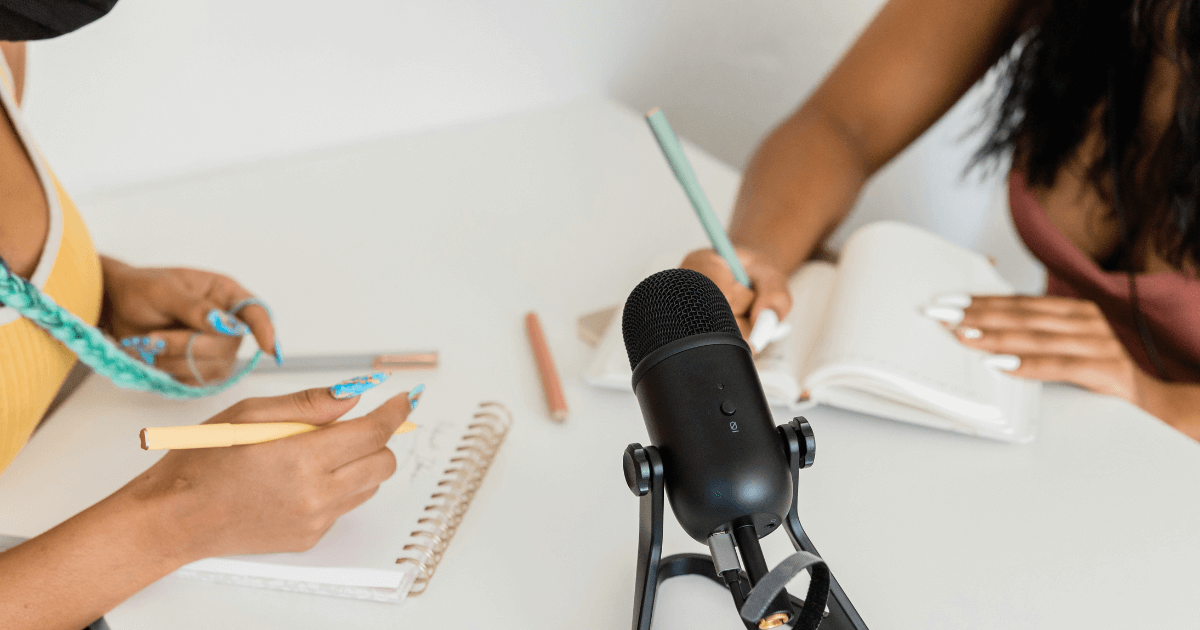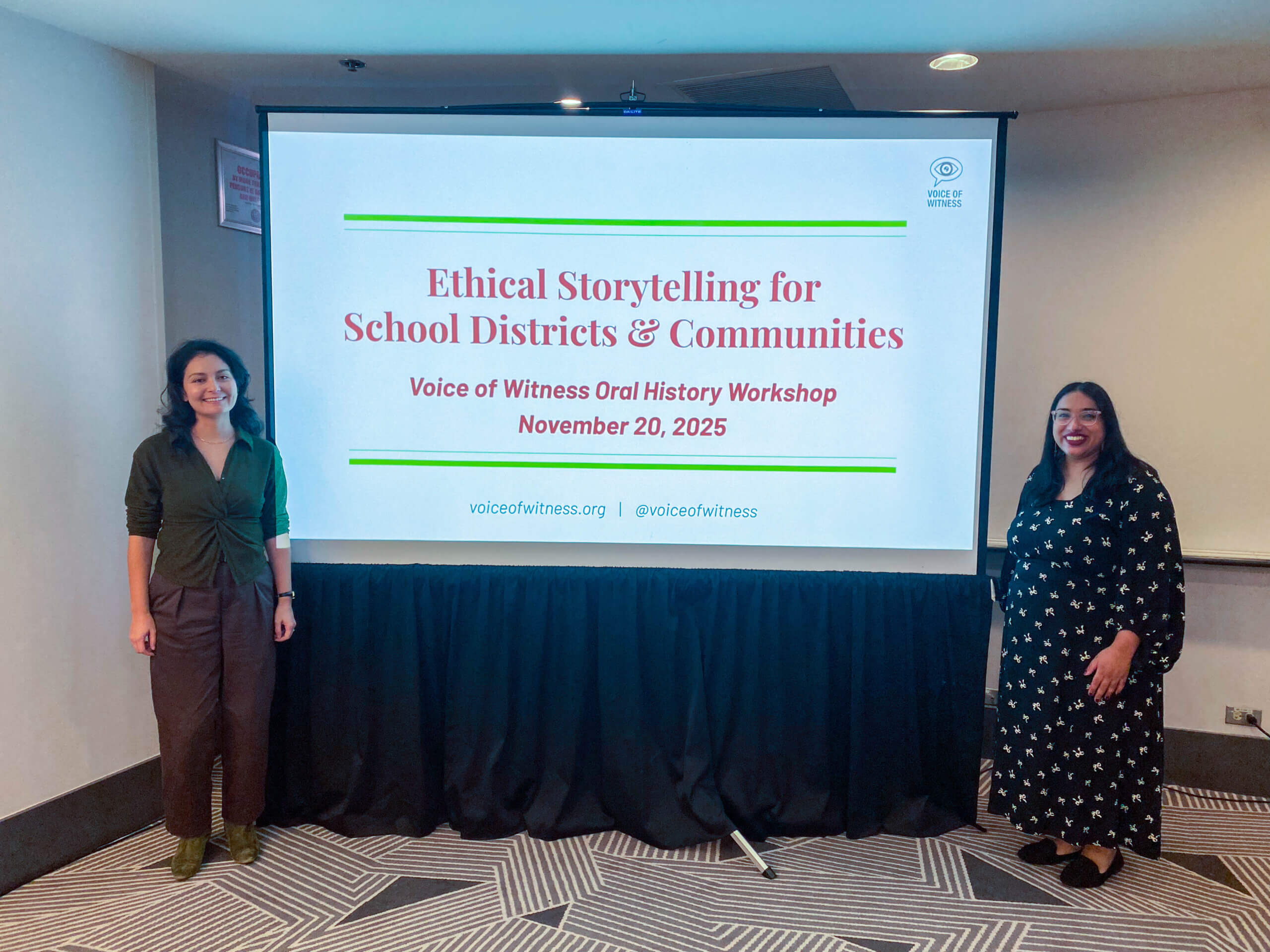Editor’s Note: The blog series “I, Witness,” seeks to explore the ethics, challenges, and possibilities of teaching and conducting oral history.
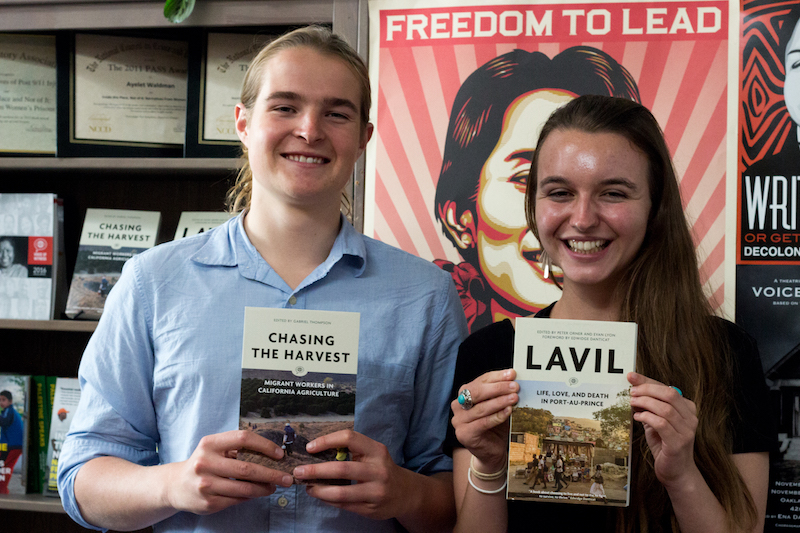
Photo: VOW summer 2017 interns Phillip Reid and Mary Kearney-Brown hold copies of our newest books.
Phillip Reid and Mary Kearney-Brown are Voice of Witness summer interns from Haverford College, outside Philadelphia. We asked them to reflect on our annual oral history training, which they attended as both participants and assistants, helping VOW Education staff Cliff Mayotte and Erin Vong. Held this year at the Asian Art Museum of San Francisco, Amplifying Unheard Voices provides educators, storytellers, and social justice advocates with the tools and methodology to conduct oral history projects in their classrooms and communities.
People are “narrators,” not “interview subjects.”
We began the seventh annual Amplifying Unheard Voices (AUV) training by recognizing the agency of the people we interview, and establishing a relationship of mutual trust and respect throughout the interview process. As Voice of Witness interns attending the four-day intensive oral history training, we had the opportunity to conduct our own oral history interviews, and connect to people from all over the country who share a passion for empathy-based storytelling.
This year’s training welcomed participants from all over the continent, such as Virginia, Florida, New Mexico, North Carolina, and even Canada. They represented a broad range of careers, including juvenile justice litigation, public education, journalism, filmmaking, and anthropology. This diversity brought unique perspectives to the workshop, and highlighted the different fields in which oral histories can be used.
We heard from many passionate speakers about various aspects of conducting oral history interviews and publishing narratives. Susan Wolf taught us how to artistically document our notes through the Making Learning Visible framework. We also had a Skype conversation with Ashley Jacobs, a narrator from Inside This Place, Not of It, about her transformative interview experience and how the process changed the way she felt about her incarceration. And Von Torres, a 2016-17 Germanacos Fellow and professor at Clovis Community College, gave an engaging presentation about using oral history in his classroom and the how stories create community.
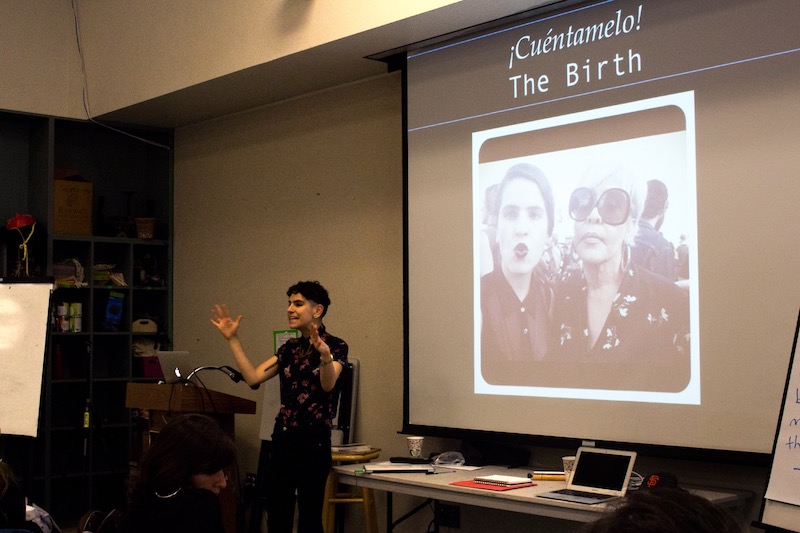
Photo: Juliana Delgado Lopera sharing the origin of her bilingual oral history book, ¡Cuéntamelo!
The second day of training featured speakers who generated a discussion on ethical considerations that should frame oral history projects. VOW Executive Director Mimi Lok facilitated a dialogue on oral history and activism. She provided vital insight into the “ecosystem” our work enters. When confronting a social issue through the lens of oral history, we must map out the environment that already exists and ensure that our work enriches that environment, rather than taking up limited resources.
In response to Mimi’s essential questions, one participant, Gail Myers, described the work she is doing with Farms to Grow to document stories from African American farming communities. It was clear that she had carefully researched the “ecosystem” surrounding this community and, finding few first-person accounts from farmers, identified a perfect niche for oral history to fill.
On our final day of training, writer/artist/oral historian Juliana Delgado Lopera presented her oral history collection, ¡Cuéntamelo!, containing narratives from 8 San Franciscan LGBTQ Latin@s over the age of 50. Her presentation was a mixture of keen advice on oral history methodology as well as emotional anecdotes from her narrators. As an alum of AUV 2013, Juliana served as the perfect role model for this year’s trainees. Her oral history collection will once again be available for purchase this fall.
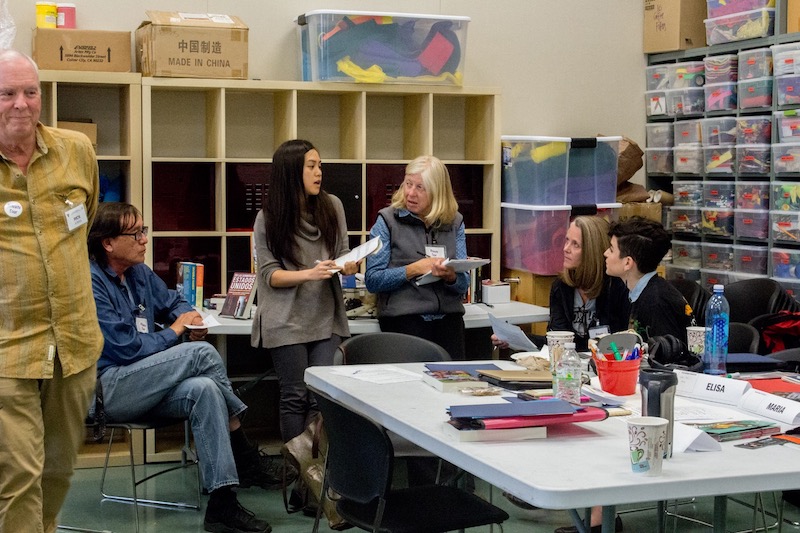
Photo: A small group discusses one of Rick Ayers’ (far left, standing) case studies.
Mary: Exploring Positionality
During the second afternoon, USF professor and long-time Voice of Witness collaborator Rick Ayers led an interactive presentation on positionality and representation in oral history. With Rick, we considered the nuances of framing an oral history project so that it highlights non-dominant, personal narratives in an empowering way by shattering stereotypes rather than unintentionally reinforcing them.
The potential for exploitation or misrepresentation in publishing narratives necessitates increased attention to methodology, and we must recognize how narratives can perpetuate reductive or harmful frameworks through which we view marginalized communities.
Rick outlined how our positionalities can influence our engagement with the people we interview, and provided useful tools for how we conduct our interviews. His presentation was a valuable resource, and underscored the importance of continually revisiting our own thought processes. I found myself referring to his lecture throughout the remainder of the training, trying to maintain an awareness of my own methodology in conducting and editing my interview in order to ensure I was honoring my narrator’s voice and story.
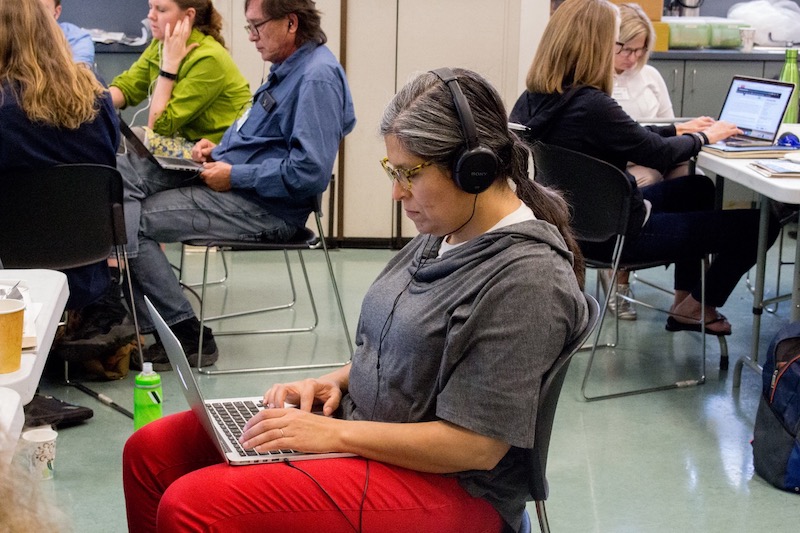
Photo: Participant Nicole Marroquin transcribes an interview she conducted.
Phillip: Sharing Oral History
Our very first group exercise—a read-aloud of an excerpt from Mr. Lai in Underground America—left me both uplifted and challenged by the idea of sharing oral history.
After engaging with the book on my own, hearing Mr. Lai’s words read aloud by my fellow participants brought new life to his story. As we progressed through the excerpt together, I was captivated by this communal navigation. Relayed through our many voices, Mr. Lai’s immigrant narrative of struggle and resilience was shared by a new audience.
At the same time, the reading also introduced an unsettling ethical dilemma about representation and distancing as we share oral histories. Who were we to tell Mr. Lai’s story for him, to reveal and discuss vulnerable details of this man’s life in our voices, and in a language other than his original Mandarin?
By the end of our training, I felt better equipped to confront these questions. I know now that narratives can be shared in a way that does not claim to be authoritative, but rather humbly and powerfully communicates a desire for people to know one another more completely. Through the medium of our own voices, we expressed a genuine desire to know him fully as a human being who has experienced injustice, but cannot be defined by that experience alone.
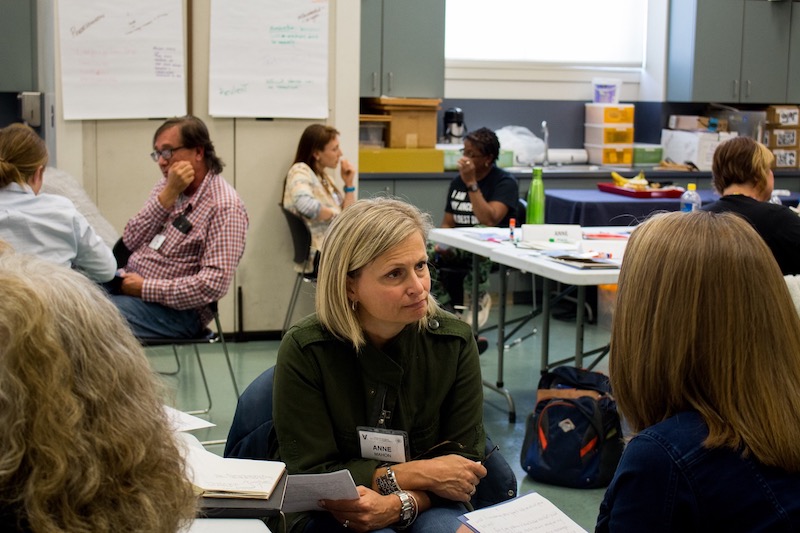
Photo: Participant Anne Mahon listens to her partner during a practice interview.
Mary: Interview Process
On the second day of the training, we partnered up to conduct our own oral history interviews. I was nervous at first, worried about being vulnerable as a narrator and cognizant of my positionality as an interviewer. These fears were soon dwarfed by the emotions that came up while interviewing my partner.
Coming into the training, I already believed in the power of oral histories and had been moved by various narratives. Interviewing my narrator about her life, however, transformed my understanding of the power of oral history and allowed me to experience first-hand the joy of connecting with another person’s story. My partner spoke with awe-inspiring openness, describing memories with vivid detail and reflecting on past experiences with insight and vulnerability. This prompted me to intentionally focus on being honest during my own interview, trying to honor her courage and willingness to share.
The process also prompted me to meditate on the care and empathy this experience requires; it was an honor to listen to and work with my partner’s story, and as I transcribed and edited her story, I recognized the importance of preserving the integrity of her narrative. I tried to preserve the spirit and nuance of the story I’d been told, and felt a profound connection to the life experience of a person I’d only just met.
I think that most, if not all, of this year’s AUV participants felt a similar level of emotional impact. I cried multiple times during our final story circle, as people read excerpts from their interviews, and was struck by the profound honesty and strength revealed in each of the stories. Similarly, it was clear that the vulnerability each narrator offered had inspired a sense of care in the editors and a desire to honor the original stories told.
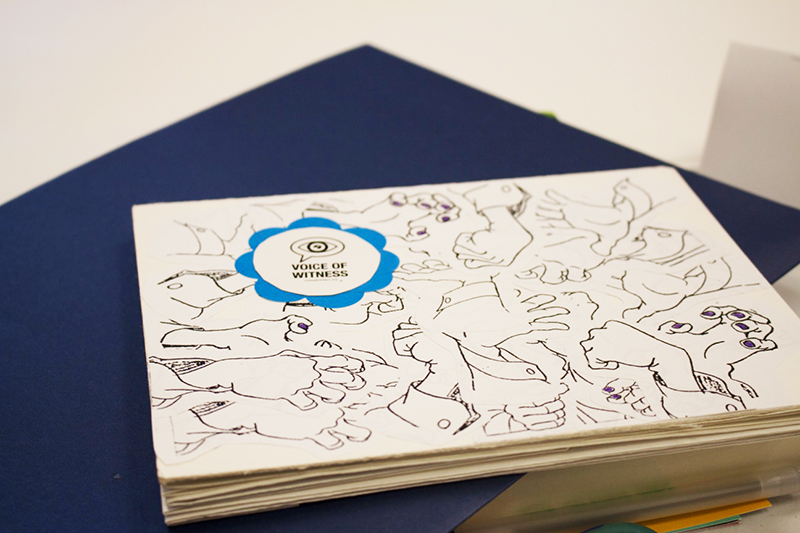
Photo: A participant’s accordion book, inspired by Susan Wolf.
Phillip: Making Memories
Though I’d already had a great deal of exposure to the oral history process so far as a VOW intern, AUV provided the opportunity to learn in a larger collaborative environment, alongside so many others who share my passion for literature, human rights issues, and the intersection between the two. On the first day of training I was anxious, trying to bottle up the wave of insights that would crash over me during our 4 days together.
Luckily, that very first morning, AUV 2016 alum Susan Wolfe introduced us to a creative note-taking process that would help us capture our experience. After her presentation, when Susan laid out the craft supplies, everyone eagerly began making the journals their own. Looking around at my fellow participants, I felt my anxieties about information overload dissipate as a member of this committed learning community.
Throughout the week, we used our journals to take notes on oral history practice and methodology, make reflective drawings, and write down quotes that preserved the insightful and hilarious interactions that we had with one another. During a discussion on self-care, trainee Charles Bowles described how he watched cartoons to relax. In his words, “I just need to watch an anvil fall on someone’s head. Is that so much to ask?” Filled with memories like this, I’m grateful to have my journal as an artifact of time spent with such a clever and compassionate group of people, and as a field guide that I will take into my continued study of oral history.
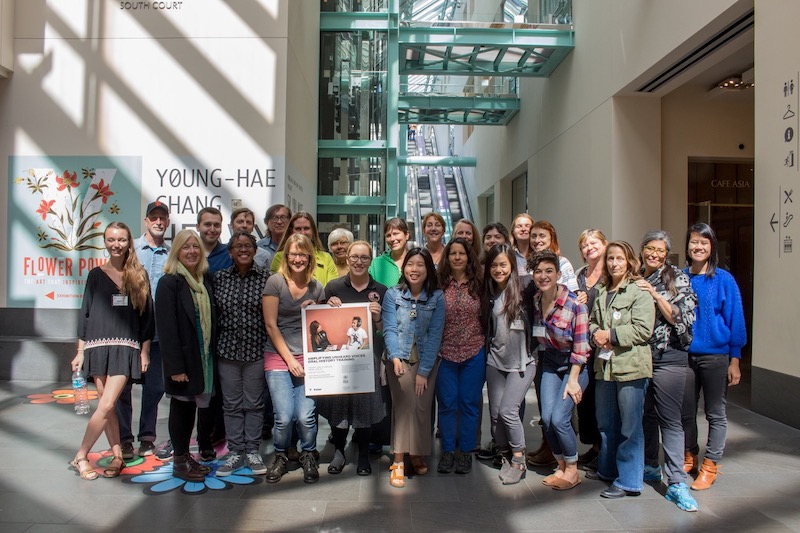
Group photo on the last day of training, missing a few of our 30 oral historians!
It was a pleasure to hear from several participants about the range of oral history projects they’ve worked on. Others who were unsure how storytelling fit into their work brought an intense curiosity, and will certainly create impactful projects in the future.
After four days of enriching time spent together as a learning community, it was difficult to see our journey come to a close. We hope that the graduates of AUV 2017 stay in touch with Voice of Witness, our wonderful guest speakers, and each other as they go on to use their new oral historian toolkit in their respective communities.
Huge shout-out to the Asian Art Museum of San Francisco for donating classroom space as well as free access to the beautiful exhibits during the week.
Many thanks to the following wonderful sponsors, who provided snacks and drinks for our 2017 AUV participants:
- Trader Joe’s 555 9th Street ◆ Noah’s Bagels 2300 16th Street
- Dandelion Chocolate 740 Valencia Street ◆ Bi-Rite Market 3639 18th Street
- Costco Wholesale 450 10th Street ◆ Starbucks Coffee 1390 Market Street
- Buca Di Beppo 855 Howard Street
Get the latest updates on the VOW Education Program. Join VOW’s mailing list.

